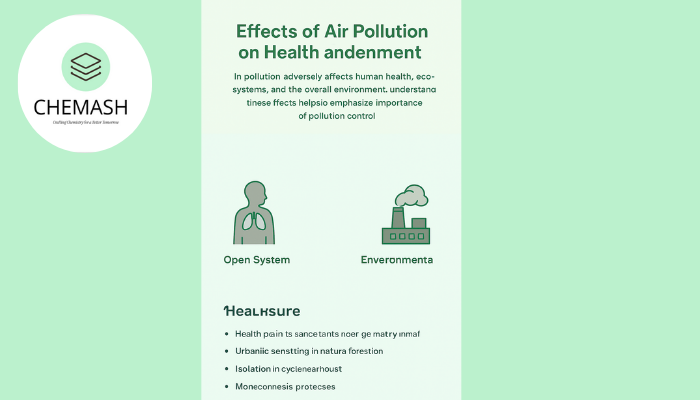
Effects of Air Pollution on Health and Environment
Air pollution affects human health, natural ecosystems, and the global environment. Understanding these effects emphasizes the importance of pollution control and sustainable living. Effects of Air Pollution
Contents
Health Effects
Exposure to polluted air can cause a range of acute and chronic health problems:
- Respiratory Issues: PM2.5, sulfur dioxide (SO₂), and nitrogen oxides (NOx) irritate the lungs, causing asthma and bronchitis.
- Cardiovascular Diseases: Long-term exposure increases the risk of heart attacks and hypertension.
- Allergic Reactions: Pollutants aggravate allergies and immune responses.
- Cancer Risk: Toxins like benzene and formaldehyde are carcinogenic.
- Impact on Children and Elderly: Vulnerable groups suffer developmental or chronic effects.
Environmental Effects
Air pollution disrupts natural ecosystems and harms biodiversity:
- Acid Rain: Sulfur and nitrogen oxides form acids that damage soils and aquatic life.
- Ozone Layer Depletion: Pollutants thin the ozone layer, increasing UV radiation.
- Global Warming: CO₂ and methane trap heat, driving climate change.
- Damage to Vegetation: Pollutants hinder photosynthesis and plant growth.
- Water Pollution: Settled pollutants contaminate rivers and lakes.
Quiz – Effects of Air Pollution
- Which air pollutant is most associated with causing acid rain?
a) Carbon monoxide
b) Sulfur dioxide ✅
c) Ozone
d) Methane
Explanation: Sulfur dioxide reacts with water vapor to form sulfuric acid in acid rain. - Long-term exposure to particulate matter primarily affects which system in the body?
a) Digestive system
b) Nervous system
c) Respiratory system ✅
d) Circulatory system
Explanation: Particulate matter damages the lungs and reduces respiratory efficiency. - Which gas is a major contributor to global warming?
a) Nitrogen
b) Oxygen
c) Carbon dioxide ✅
d) Helium
Explanation: Carbon dioxide traps heat, leading to the greenhouse effect. - Ozone layer depletion increases the risk of:
a) Acid rain
b) UV radiation exposure ✅
c) Respiratory diseases
d) Soil erosion
Explanation: Thinning ozone allows more ultraviolet radiation to reach Earth’s surface.
Up Next: Control Measures and Air Quality Index (AQI) —
Learn how to monitor and reduce pollution effectively.
Frequently Asked Questions
Q1. How to stay safe during high AQI days?
Limit outdoor exposure, use N95 masks, and keep windows closed.
Q2. Are PM10 and PM2.5 equally harmful?
No, PM2.5 is more dangerous as it penetrates deeper into the lungs.
Q3. How does air pollution relate to climate change?
Emissions of CO₂ and CH₄ increase global temperatures; black carbon adds warming effects.

Pingback: Types of Pollutants - CHEMASH